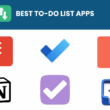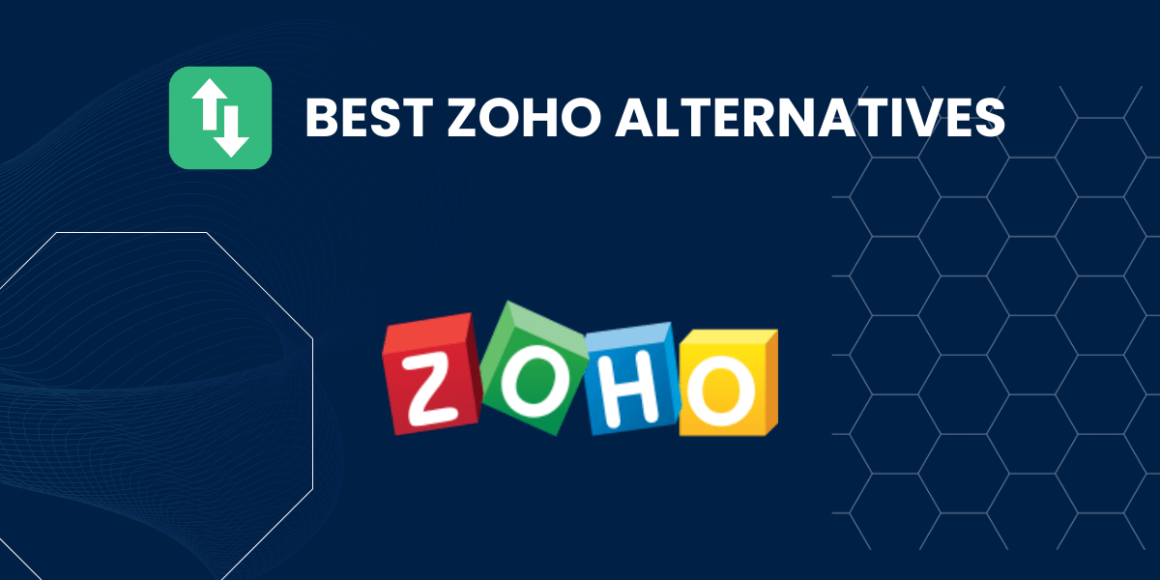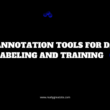Table of Contents Show
Are you looking for a reliable alternative to Zoho for your business? In this blog post, we will explore why considering alternatives is important, introduce you to the top alternatives in the market, and provide tips on how to choose the right one for your specific needs.
Stay tuned and discover a game-changing solution that can streamline your operations and boost productivity.
Why consider alternatives to Zoho?
If you’re looking for an alternative to Zoho, consider the top option: [Alternative Name]. With its competitive pricing and robust set of features, it offers a cost-effective solution for your business. Additionally, its user-friendly interface makes navigation and project management seamless, providing a better user experience compared to Zoho.
1. Cost
When considering cost, it is important to explore alternative options to Zoho for your business. While Zoho may be popular in the market, other top alternatives offer competitive pricing plans without compromising on essential features. By exploring these alternatives, you can find a solution that fits within your budget while still providing effective marketing and project management capabilities.
When comparing costs between different platforms, it is crucial to evaluate not only the initial investment but also any additional expenses such as upgrades or add-on features. This comprehensive analysis will help you make an informed decision about which alternative offers the best value for your business’s needs.
2. User interface
When it comes to user interface, Zoho and its alternatives offer intuitive and user-friendly designs. These platforms prioritize ease of navigation and accessibility to ensure a seamless experience for businesses. Additionally, they provide customizable layouts that allow users to tailor the interface according to their specific needs in project management or marketing tasks.
3. Features
Zoho incorporates several modules but may miss out on the in-depth functionality that can be fulfilled by the other tools available in the market.
The 11 top alternative to Zoho for your business
1. Salesforce
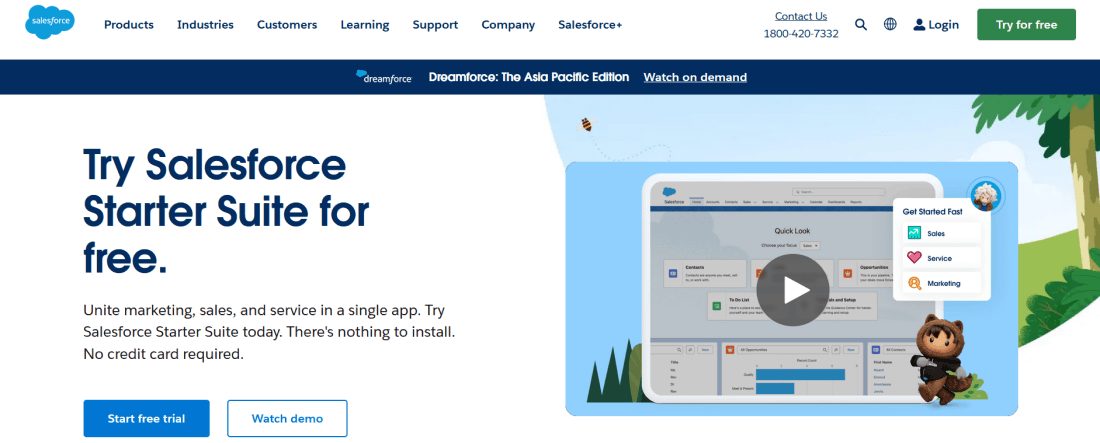
Salesforce is a highly customizable and robust CRM platform that offers a wide range of features to enhance your business processes.
With its powerful tools for sales, marketing, and customer service, Salesforce provides an efficient alternative to Zoho for managing customer relationships and driving growth. From lead generation to pipeline management, Salesforce offers comprehensive solutions tailored to meet the unique needs of your business.
Key Benefits of Salesforce:
- Salesforce’s cloud-based infrastructure ensures seamless accessibility from anywhere at any time, allowing your team to stay connected and collaborate effectively.
- Its intuitive interface simplifies data entry and navigation while providing advanced analytics capabilities for gaining valuable insights into customer behavior.
- With its extensive AppExchange marketplace, Salesforce also enables you to integrate third-party applications seamlessly, further enhancing the functionality of the platform.
2. HubSpot
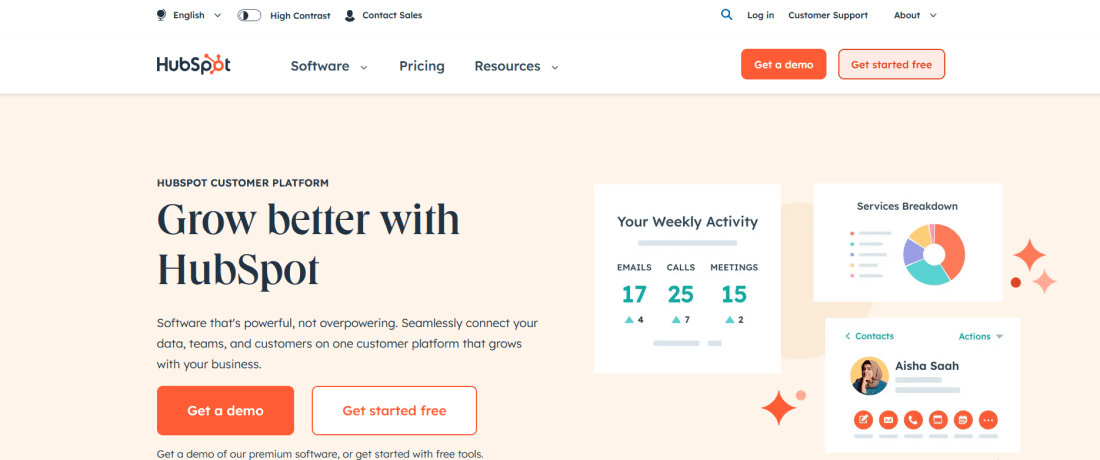
HubSpot is a leading CRM platform that offers robust features and tools to help businesses streamline their sales, marketing, and customer service processes.
With its user-friendly interface and comprehensive functionalities, HubSpot provides an excellent alternative to Zoho for businesses looking for a powerful CRM solution.
Key benefits of using HubSpot include:
- Integrated sales, marketing, and customer service modules
- Advanced analytics and reporting capabilities
- Seamless integration with other business tools such as email marketing software and social media platforms
3. Microsoft Dynamics 365
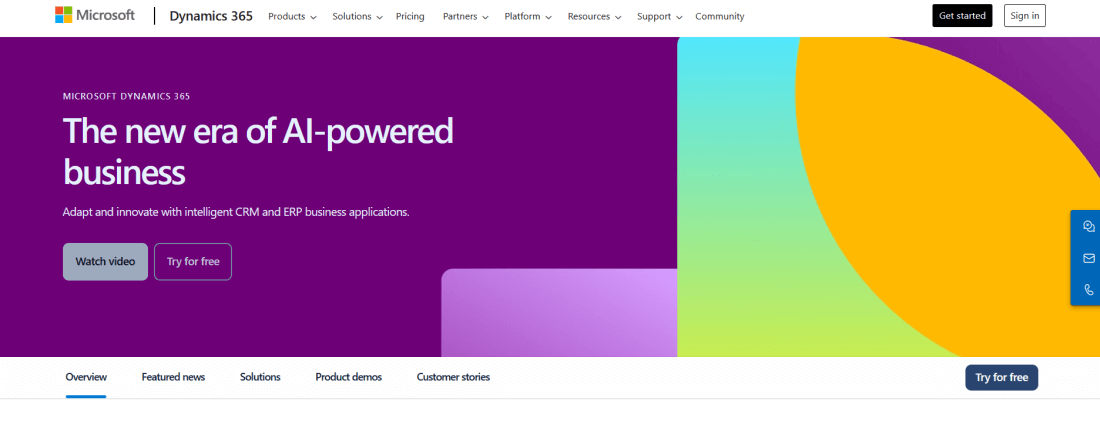
Microsoft Dynamics 365 is a powerful and versatile CRM solution that offers comprehensive tools for managing customer relationships, sales, marketing, and service. With its integration capabilities and extensive functionality, it provides an excellent alternative to Zoho for businesses looking to streamline their operations and enhance productivity.
From lead generation to customer support, Microsoft Dynamics 365 offers a seamless user experience that can help drive growth and success.
Key Benefits of Microsoft Dynamics 365:
- Microsoft Dynamics 365 stands out among its competitors with its robust features such as AI-driven insights, customizable dashboards, automated workflows, and seamless integration with other Microsoft products like Office 365.
- This cohesive ecosystem enables businesses to have a holistic view of their customers’ journeys while leveraging the power of data analytics.
- By choosing Microsoft Dynamics 365 as your CRM platform, you gain access to an array of tools that will empower your team to deliver exceptional customer experiences while maximizing efficiency in every aspect of your business operations.
4. Monday.com
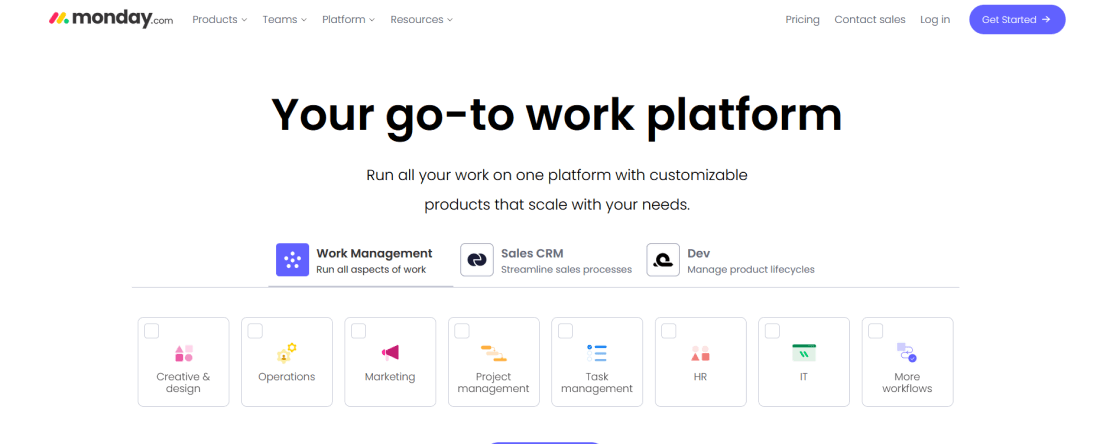
Monday.com is a versatile CRM platform that offers a customizable and visual approach to managing customer relationships. With its user-friendly interface and extensive features, Monday.com provides an excellent alternative to Zoho for businesses looking for a modern and intuitive CRM solution.
Key benefits of using Monday.com:
- Customizable workflows and boards: Monday.com allows you to create custom workflows and boards that align with your specific business processes. Whether it’s managing leads, tracking customer interactions, or coordinating tasks with your team, Monday.com provides the flexibility to adapt to your unique needs.
- Visual project management: With its visual interface, Monday.com provides a clear and intuitive way to track and manage customer-related tasks and projects. From assigning tasks to team members to monitoring progress in real-time, Monday.com helps streamline collaboration and improve productivity.
- Integration capabilities: Monday.com integrates seamlessly with various third-party applications, such as email marketing software, project management tools, and communication platforms. This integration enables you to centralize your customer data and streamline workflows across different systems, enhancing efficiency and accuracy.
- Advanced analytics and reporting: Monday.com offers robust analytics and reporting capabilities, allowing you to gain valuable insights into customer behavior, team performance, and business metrics. With customizable dashboards and visual reports, you can easily track key performance indicators and make data-driven decisions.
- Mobile accessibility: Monday.com is accessible on mobile devices, enabling you to stay connected and manage customer relationships on the go.
5. Wrike
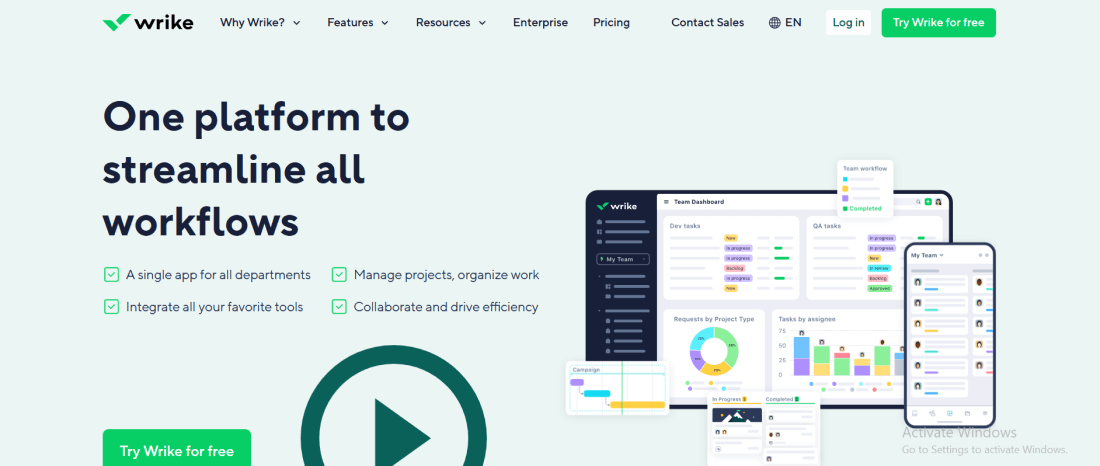
Wrike is a powerful CRM platform that focuses on project management and collaboration. It offers a range of features that can help businesses streamline their customer relationship management processes.
Key Benefits of Wrike Are:
- Project management capabilities: Wrike provides a comprehensive set of project management tools that can help you organize and track customer-related tasks. From assigning tasks to team members to setting deadlines and monitoring progress, Wrike allows you to efficiently manage your customer projects and ensure timely delivery.
- Collaboration features: With its robust collaboration features, Wrike enables seamless communication and collaboration among team members. You can easily share files, comment on tasks, and have real-time discussions, fostering effective teamwork and enhancing productivity.
- Customizable workflows: Wrike allows you to create custom workflows that align with your specific business processes. You can define stages, set dependencies, and automate repetitive tasks, enabling you to streamline your CRM processes and improve efficiency.
- Integration capabilities: Wrike integrates with various third-party applications, such as email clients, document management systems, and customer support platforms. This integration allows you to centralize your customer data and streamline workflows across different systems, eliminating the need for manual data entry and reducing the risk of errors.
- Advanced reporting and analytics: Wrike offers advanced reporting and analytics features that provide insights into your team’s performance, project progress, and customer interactions. You can generate customizable reports, track key performance indicators, and make data-driven decisions to optimize.
6. Smartsheet
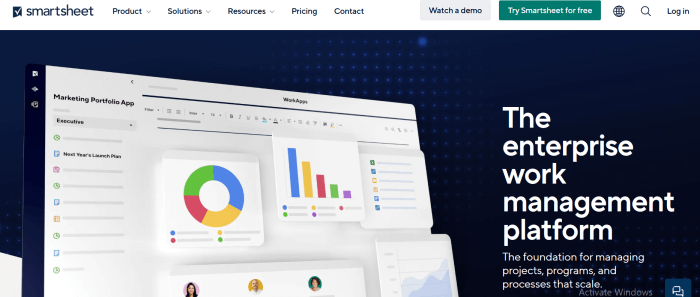
Smartsheet is a versatile CRM platform that combines project management, collaboration, and automation capabilities. It is a robust tool that can work as a good Zoho alternative for SMEs and enterprise-level users.
It is great for team collaboration, project management, customer management, and workflow optimization.
Key Benefits of Smartsheet:
- Project management and automation: Smartsheet provides a range of project management features that help you streamline your customer relationship processes. You can create and assign tasks, set deadlines, and track progress, ensuring timely delivery and efficient project management. Additionally, Smartsheet allows you to automate repetitive tasks, reducing manual work and improving productivity.
- Collaboration and communication: With its collaboration tools, Smartsheet enables effective communication and collaboration among team members. You can share files, comment on tasks, and have real-time discussions, fostering teamwork and enhancing productivity. Smartsheet also allows you to create and share customizable dashboards, providing a centralized platform for team members to access and update customer information.
- Customizable workflows: Smartsheet offers customizable workflows that allow you to align your CRM processes with your specific business requirements. You can define stages, set dependencies, and automate processes, ensuring consistency and efficiency in your customer relationship management. By streamlining workflows, you can reduce errors and improve the overall customer experience.
- Integration capabilities: Smartsheet integrates with various third-party applications, enabling you to centralize your customer data and streamline workflows across different systems. You can integrate with email clients, document management systems, and customer support platforms, eliminating the need for manual data entry and reducing the risk of errors.
7. ClickUp
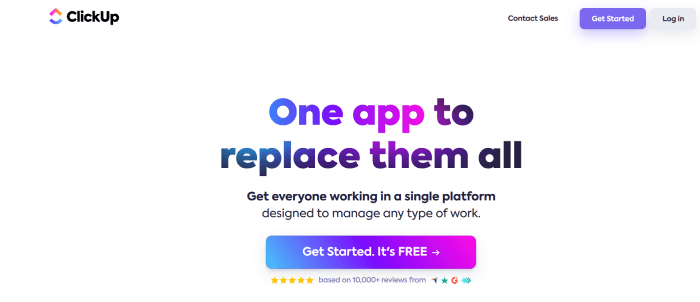
Next up on our list of the best Zoho alternatives is ClickUp.
ClickUp is a comprehensive CRM platform that offers a wide range of features to enhance your team’s productivity and optimize your customer relationship management.
Key Benefits of ClickUp:
- Task management and organization: ClickUp provides a robust task management system that allows you to create, assign, and track tasks efficiently. You can set deadlines, assign priority levels, and categorize tasks into different projects or categories, ensuring that nothing falls through the cracks. With ClickUp’s intuitive interface and customizable task views, you can easily manage and organize your team’s workload.
- Collaboration and communication: ClickUp offers various collaboration features to facilitate effective communication and teamwork. You can assign tasks to team members, track their progress, and leave comments or feedback directly on tasks. ClickUp also provides real-time notifications and activity streams, keeping everyone updated on project developments and fostering collaboration.
- Customization and flexibility: ClickUp allows you to customize your CRM workflows according to your specific business requirements. You can create custom fields, define task statuses, and set up automated workflows, ensuring that your CRM processes align with your unique needs. ClickUp’s flexibility enables you to adapt and scale your CRM system as your business grows.
- Reporting and analytics: ClickUp offers comprehensive reporting and analytics capabilities, providing valuable insights into your team’s performance and project progress. You can generate customizable reports and track key performance indicators, enabling data-driven decision-making and continuous improvement.
8. Bitrix24
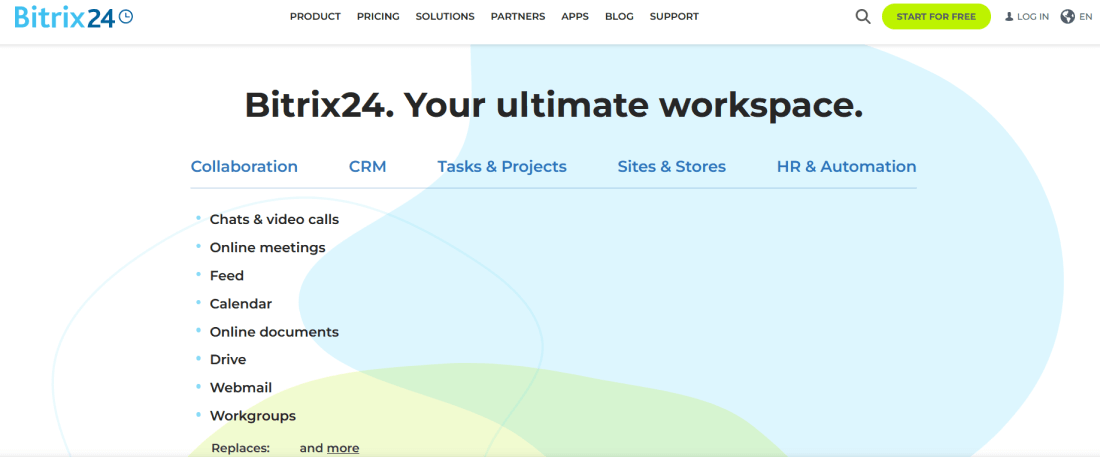
Bitrix24 is a robust CRM platform that offers a wide range of features to help streamline your customer relationship management.
This Zoho alternative has quite a vast range of feature sets that businesses can use as an all-in-one workspace. However, at times it gets too cluttered for some users, but some users find it good for cost saving.
Key Benefits of Bitrix24:
- Contact management: Bitrix24 allows you to store and manage all your customer information in one centralized database. You can easily create and update contacts, track interactions, and communication history, and segment your contacts based on different criteria. This helps you to have a complete view of your customers and provide personalized and targeted communication.
- Sales pipeline management: With Bitrix24, you can easily track the progress of your sales opportunities and deals. You can create custom sales pipelines, define stages, and set up automatic notifications and reminders. This helps you to keep track of your sales process, identify bottlenecks, and take necessary actions to move deals forward.
- Task and project management: Bitrix24 offers a comprehensive task and project management system. You can create tasks, assign them to team members, set deadlines, and track progress. With features like task dependencies, Gantt charts, and time tracking, you can ensure efficient project execution and timely delivery.
- Communication and collaboration: Bitrix24 provides various communication tools to facilitate collaboration within your team. You can use features like instant messaging, video calls, and activity streams to stay connected and share information. You can also create workgroups and share documents, enabling seamless collaboration and knowledge sharing.
9. Pipedrive
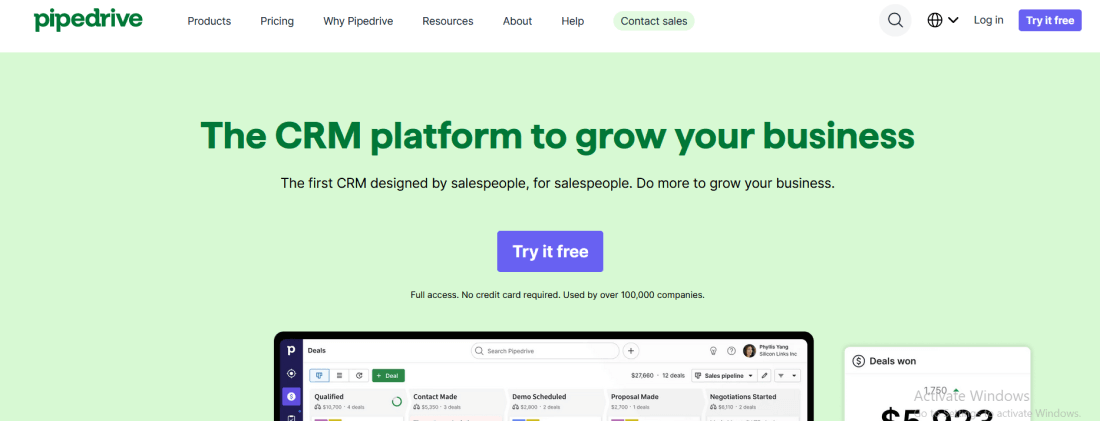
Pipedrive is a popular CRM platform known for its user-friendly interface and powerful features. This CRM platform is designed specially for sales team, and for businesses to help them in growth.
Key Benefits of Pipedrive:
Here are some key benefits of using Pipedrive as your CRM system:
- Sales pipeline management: Pipedrive offers a visual and intuitive sales pipeline that allows you to easily track the progress of your deals. You can customize your pipeline stages, set up automatic reminders, and visualize your sales process to ensure nothing falls through the cracks.
- Contact management: Pipedrive enables you to keep all your customer information in one place. You can create and update contact records, track communication history, and segment your contacts based on various criteria. This helps you to effectively manage your relationships and provide personalized interactions.
- Email integration: Pipedrive integrates seamlessly with popular email providers like Gmail and Outlook. This allows you to sync your emails, send and receive messages directly from the CRM, and track email interactions with your contacts. With email templates and tracking capabilities, you can save time and improve your email communication.
- Sales reporting and analytics: Pipedrive provides detailed sales reports and analytics to help you gain insights into your team’s performance and identify areas for improvement. You can track key metrics, generate customizable reports, and visualize data through charts and graphs. This enables data-driven decision-making and helps you optimize your sales strategy.
- Mobile app: Pipedrive offers a mobile app that allows you to access your CRM system on the go.
10. ActiveCollab
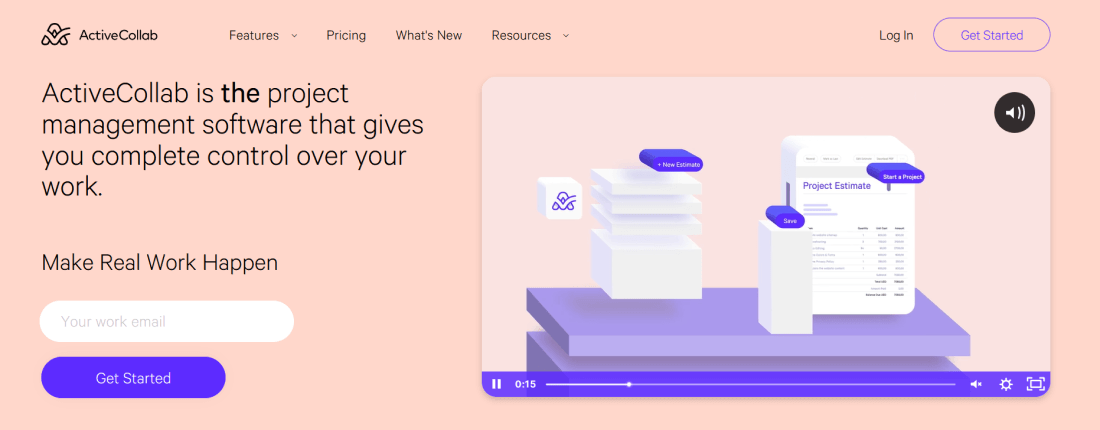
Next on our list of the best Zoho alternatives is ActiveCollab.
ActiveCollab is a project management software that offers a variety of features to help you streamline your project workflow.
Key Benefits of ActiveCollab:
- Task management: ActiveCollab allows you to create tasks, assign them to team members, set deadlines, and track their progress. You can also create subtasks, set dependencies, and add comments and attachments to keep all project information in one place. This helps you ensure that tasks are completed on time and nothing is overlooked.
- Collaboration and communication: ActiveCollab provides a centralized platform for team collaboration. You can create project discussions, share files, and leave comments on tasks to facilitate communication within your team. With real-time updates and notifications, everyone stays on the same page and can easily collaborate on projects.
- Time tracking and invoicing: ActiveCollab offers time tracking features that allow you to track the time spent on tasks and projects. You can generate detailed time reports and use this data for accurate client billing and project costing. The software also integrates with popular invoicing tools, making it easy to create and send invoices based on tracked time.
- Project planning and scheduling: ActiveCollab provides project planning and scheduling tools that help you create project timelines, set milestones, and allocate resources. You can visualize your project progress through Gantt charts and make adjustments to your schedule as needed. This helps you stay organized and ensures that projects are completed on time.
11. Zendesk

Another Zoho alternative is Zendesk.
Zendesk is a robust customer service tool that helps users streamline operations for their sales and support teams.
Zendesk helps users to design a customized user experience using automation, and AI.
Key Benefits of Zendesk:
- Live chat and messaging: Interact with your website and social platform customers with the help of Zendesk. Chat with your customers, and engage with them in real time.
- Ticketing system: Streamline processes for the sales and support teams with the help of the Zendesk ticketing system.
- Knowledgebase, and help center: Develop a user-friendly knowledgebase and help center that you can add to your online resource.
- Workforce management: Manage your teams, and track their performance using Zendesk.
How to choose the right alternative?
When evaluating integration options for an alternative to Zoho, consider how well it integrates with other essential tools and systems used by your business.
Look for seamless integration capabilities that will streamline workflows and enhance overall efficiency.
1. Assess your business needs
Assessing your business needs is crucial when looking for an alternative to Zoho. Consider the following points:
- Define your specific requirements
- Determine the size and complexity of your business operations
- Identify key features and functionalities needed
By thoroughly assessing your business needs, you can find the perfect alternative to Zoho that meets all of your requirements.
2. Consider scalability
Consider scalability when choosing an alternative to Zoho for your business. Ensure that the software can handle your growing needs and accommodate increased user activity without compromising performance. Look for a solution that offers flexible pricing plans, allowing you to easily upgrade or downgrade as your business expands or contracts.
Another important aspect of scalability is the ability to integrate with other systems and applications seamlessly. Choose a platform that offers robust integration options, enabling smooth data flow across different tools and platforms. This will help streamline workflows, improve efficiency, and support future growth opportunities for your business.
3. Evaluate integration options
When evaluating integration options for your business, it is essential to prioritize compatibility and ease of implementation. Look for solutions that seamlessly integrate with your existing software systems without requiring significant modifications. Additionally, consider the level of support and documentation available from the vendor to ensure a smooth transition process.
Furthermore, explores integration options that offer flexibility and customization capabilities. This will allow you to tailor the solution to meet your specific business requirements. Consider platforms that have robust APIs or connectors, enabling seamless data exchange between different applications and enhancing overall workflow efficiency.
Conclusion
When seeking an alternative to Zoho for your business, it is essential to consider the introduction of a robust and versatile platform that meets your specific needs.
These alternative offers key features and benefits such as seamless integration with various tools, enhanced customization options, and advanced analytics capabilities.
Moreover, its pricing structure ensures affordability without compromising on quality or functionality when compared to Zoho. With this alternative solution, you can elevate your business operations and streamline processes effectively.
Read More articles:
- Exploring Zoho Webinar: Features, Pricing, and Benefits
- Zoho Projects Review: Best Practice, Features, and Pricing
- 21 Best Kanban Software Tools
- 5 Effective Digital Marketing Strategies to Boost Your Online Presence
- 10 Expert-Approved Productivity Hacks to Supercharge Your Efficiency
- The Ultimate Task Prioritization Tips for Optimal Workflow




